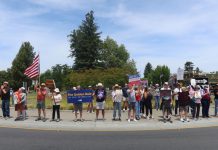Other items on town council agenda include budget review and wastewater report
In a surprising reversal from previous rhetoric, the town of Windsor seems poised to cave to the litigation demands of developers who were unhappy with the passage of the town’s all-electric reach code.
A Times article from December of 2019 outlined the lawsuits from developers Bill Gallaher and Windsor-Jensen Land Co., LLC, but at the town sounded committed to fighting.
“The filing of the lawsuits is not surprising, particularly given that Windsor was the first in the county to adopt an all-electric code,” said Town Manager Ken MacNab in the 2019 article. “The issues raised in the lawsuits generally follow the issues raised in communications received from the plaintiffs during the adoption process and were anticipated.”
Those issues included an insinuation that the code implementation required CEQA oversight to be legal. At an Oct. 16, 2019 council meeting, then-vice mayor Deborah Fudge said, “It’s really sad to me when I see CEQA misused. It’s sad to me when I see a local developer using it to try to subvert something good for the environment. We are in a climate emergency. There is no more time to talk. We may already be too late. We must do all of it, everything, and be at net zero by 2050. We have to start now; we know that, even those who fight it, know it. It’s precedent setting, and that’s why the threat is thrown at us. It’s a scare tactic. To me it feels like a bully tactic.”
“Our main concern is about plaintiffs who do not appear interested in supporting the town council’s effort to take a small step towards addressing the environmental impacts of climate change,” said MacNab in 2019.
At the time, the town was confident in the legal basis for its code change, MacNab acknowledged that lawsuits are always problematic. “We are confident that the ordinance is consistent with local policies and state mandates to reduce greenhouse gas emissions and that the process we used in adopting the ordinance was correct,” he said. “But, the length of time needed to resolve any case where there is uncertainty or complexity is difficult to assess. A trial could take months to complete — possibly longer.”
That appears to have been what happened here, as the agenda summary for the repeals indicates the decision was the result of “negotiation.”
“The town and the petitioners in the reach code cases have reached a negotiated settlement. The terms of that settlement require the town to delete Chapter 7, “All-Electric Residential Reach Code” from the Windsor Municipal Code Title VII, “Building and Housing,” and all related changes that were made to the 2019 California Energy Code. Therefore, adoption of this action would effectuate the terms of the settlement agreements in the reach code cases and is necessary to ending litigation in those cases. Rejection of this action would leave the All-Electric Reach Code in place but would require the Town to resume defending the litigation in the Reach Code Cases,” it reads.
Other agenda items
In addition to the repeal of the reach code, two other items are up for discussion and approval on the council’s regular calendar.
Financial update for Fiscal Year (FY) 2019-20 (preliminary year-end) — There will be a report on the town’s FY2019-20 financial performance. The analysis is focused on the General Fund, though the projections are preliminary and subject to change based on actuals and any remaining/pending budget entries made effective through June 30, 2020.
A long-standing fiscal policy of the town is to maintain a minimum fund balance in the General Fund of 25% of expenditures, and the current FY2019-20 unaudited fund balance is projected at 30% of expenditures, which is down from the prior year-end actual of 38%. The decrease in the ratio is due to reduction in revenues as a result of COVID-19 shut down.
While revenue in general has dropped, two areas remained surprisingly steady, and even increased: franchise fees and property tax. However, expenditures also dropped, and the town expended 89% of its appropriated FY2019-20 budget, which equates to coming in $2.5 million under budget.
Recycled Water Storage and Use Study — On Aug. 21, 2019, the town council approved a professional services agreement with Brelje and Race Consulting Engineers to create a Recycled Water Storage and Use Study. A public workshop was held on Nov. 18, 2019, to engage recycled water users and the community in the study.
The purpose study is to evaluate the town’s existing recycled water program under current and anticipated future flow conditions, based on the 2040 General Plan and the 2019 Water Reclamation Facility Modernization Study, to ensure operational reliability targets are satisfied, regulatory compliance is achieved, and the town’s priorities for recycled water are being met.
Based on updated recycled water production and demand data, a range of strategies for evaluating options for recycled water use was created, including storage and distribution alternatives. Numerous strategies were screened based on their feasibility and were narrowed down to three options for more detailed analysis: (1) Increase Geysers Capacity; (2) Interagency Storage; and (3) Increase Town Storage.
The study evaluated these scenarios using the recycled water program goals approved by council and determined that no single scenario alone met all of the goals, with each scenario having its own benefits and disadvantages. As an outgrowth of this evaluation, there was, however, a clear path for both short-term and long-term recommendations. Drawing on strategies from each of the scenarios, the study develops a plan to incrementally expand the town’s recycled water use and storage.
The short-term recommendations include that the town should immediately increase to the next step in the Geysers Agreement, and increase average daily flows from 0.53 MGD to 0.75 MGD in addition to pursuing a Joint Use Program with Sonoma Water to achieve interagency recycled water management and storage.
As part of the seasonal joint irrigation operation, the town should prepare to increase recycled water irrigation on town-owned irrigation lands or future equivalent irrigation sites. At the same time, the town should begin exploration for opportunities to build a joint storage reservoir, and if this is not possible, move forward with the design and funding for town-owned storage. A recycled water market assessment should also be initiated to evaluate customer demand for an increased recycled water supply, which will coincide with an increase in storage.
Long term recommendations incorporate the construction of a new recycled water reservoir and either the connection of new recycled water customers or the acquisition of additional town- owned lands to be used for irrigation.









